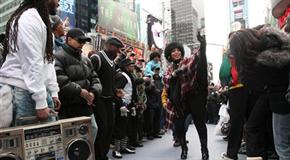
Daily Pulse
Get Pollstar News and more delivered right to your inbox with Pollstar Daily Pulse.
By signing up, you agree to Pollstar’s Privacy Policy and Terms of Use

Get Pollstar News and more delivered right to your inbox with Pollstar Daily Pulse.
By signing up, you agree to Pollstar’s Privacy Policy and Terms of Use
About 100 dancers descended on Times Square in a “flash mob” organized through the Internet. As startled tourists looked on, they recreated one of the show’s “Soul Train lines” in which people would take turns dancing toward a TV camera while showing off their most outrageous moves.
“Don Cornelius was a big influence in my life, and I just wanted to pay tribute,” said disc jockey Jon Quick, as he held up a speaker blasting disco grooves. “He was playing the music that nobody else wanted to play. He was an amazing man.”

Cornelius, 75, died of a self-inflicted gunshot wound on Wednesday. He had suffered from health problems, a difficult divorce, and had pleaded no contest to a misdemeanor spousal battery charge in 2009.
But on Saturday fans praised Cornelius’ vision in creating, hosting and selling “Soul Train” to television stations that were originally skeptical about programming aimed at blacks. The show aired from 1971 to 2006.
“Don Cornelius brought soul to the whole world,” said Ramona Hamm, 37, who came to Times Square with her 9-year-old daughter, Kayla Charles. The dancers bounced down Broadway for about 45 minutes until police told the party to disperse.
In Harlem, the Rev. Al Sharpton, a civil rights activist, led a tribute to Cornelius as part of the weekly community meeting at the headquarters of his National Action Network. In 1974, a 19-year-old Sharpton appeared on “Soul Train” to present an award to his mentor James Brown, the legendary soul singer.
Singer Roberta Flack said Cornelius was an inspiration to other black performers and entrepreneurs.
“He didn’t have a great big light telling him, ‘Go over here, don’t go over there, watch where you step, there’s a hole right there,’“ Flack said. “He stepped.”
Former “Soul Train” dancer Tyrone Proctor recalled how he hid in the trunk of a friend’s car to get through the gates of the studio where “Soul Train” was filmed in 1972. Cornelius liked his dance moves and let him stay, dubbing Proctor “The Bone” because he was so skinny.
“He turned us into stars,” Proctor said. Moves that “Soul Train” dancers developed spread nationwide and are now staples of music videos and pop concerts.
“Blocking, popping, ticking, waacking, punking – when Madonna does what she does at the Super Bowl, you’ll see some of these things done there,” Proctor said. “Don Cornelius created all of this. It came out of his mind.”
Fans recalled tuning in to see “Soul Train’s” cartoon train chugging across their television screens. When Flack recalled Cornelius’ stiff-necked delivery, the Harlem crowd of about 300 people laughed knowingly.
William “A.J. Dynamite” Aponte, a keyboard player, said he was ecstatic as a kid when his idol, Elton John, appeared on the show. He says the appearance showed that people of all races could find common ground in music.
“He sang ‘Benny and the Jets,’ and I thought it was so great because Elton John is not black, he’s white and he’s British,” Aponte said. “It influenced me to want to do music.”
Proctor said Cornelius was also generous. When Proctor won a car on “American Bandstand,” ‘‘Soul Train’s” competition, Cornelius paid the $334.25 in taxes so the struggling dancer could receive his award.
“He wrote the check out and that was it, no questions asked. He just said, ‘Go get the car,’“ Proctor said.
Proctor and other speakers said they were shocked when they heard that Cornelius had committed suicide. Author Terrie Williams named other black performers who had killed themselves and said Cornelius’ death should be a warning for victims of depression to seek help.
“One of the things that Don’s death brought us to is that we’ve got to look in the mirror before we end up in this kind of situation,” Sharpton told the crowd.
 Daily Pulse
Subscribe
Daily Pulse
Subscribe